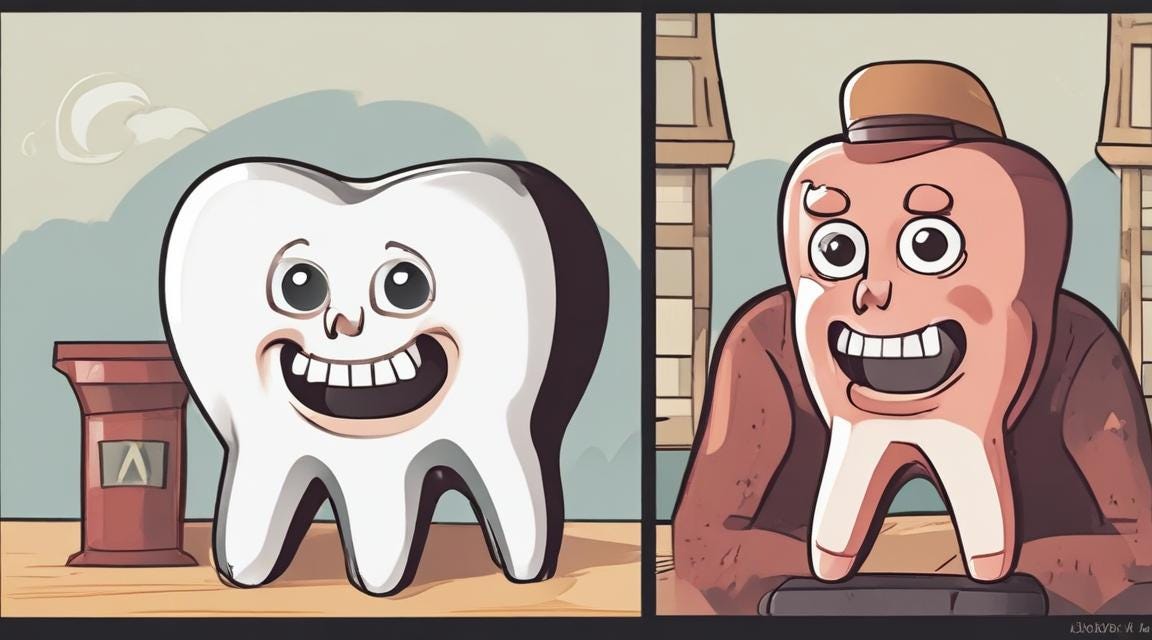My Toothache Called. It Said: "Embrace What Hurts"
The pain of avoidance vs. the discomfort of growth
I’m trying to distract myself from the worst toothache I’ve ever had.
Scratch that.
The worst extended pain I’ve ever experienced.
Last night, it sneaked in out of nowhere.
First, it was a minor throbbing at the back of my upper jaw after dinner. It steadily grew throughout the evening and by 3 a.m., it was acute enough to wake me from a deep sleep.
Then, I spent a couple of hours lying on my side in the fetal position, bobbing back and forth until I passed out at some point.
More glorious pain upon waking. Repeat.
I made a last-minute dentist appointment first thing this morning, but they couldn’t see me until Monday. So, I’ve been Tylenol/ibuprofen-flipping most of the day, which has helped take some of the edge off.
The dentist recommended I visit urgent care if I needed something stronger, and—even though I broke and healed my collarbone a few years ago relying solely on ibuprofen—this is a special kind of hell that might warrant an exception.
My Compass Points North—But I Don’t Want to Go North!
It’s been my experience that suffering clarifies.
Not mentally, necessarily, especially with this intensity.
Instead, I’ve found suffering defines. It simplifies.
In the presence of deep, fundamental discomfort, I’m able to provide an authentic answer to a deeply guiding question:
Does this serve me?
In the absence of suffering, it’s easy for my ego to rationalize the benefit of something otherwise against my best interests. For example:
Take a hit off that vape pen/have a beer. It will make for a fun time. Screw how it interacts with my medication.
That person’s driving too slowly. Yelling will help them get their act together. Don’t worry about my guilt later for acting uncompassionately.
Avoid that negative feeling now. That way, I won’t have to feel less than. I’ll come back and work through it at some point… don’t worry.
I can always say or write it to them later. They know how I feel.
This relationship isn’t working for me. But I’m addicted to the rare, fleeting instances when it does work, so I’ll keep chasing.
With the clear set of boundaries provided by deep discomfort, though, these scenarios naturally resolve themselves:
Altering my consciousness as part of an escape— instead of as an entrance—isn’t worth the temporary high. I want to feel better, permanently, not temporarily.
Think of everything you’re going through at this moment, Derek. That person could be suffering just as much—if not more. Be kind and gentle. Smile; wish them well.
I’m already in great pain. Can I really suffer more? That feeling’s already here, too. I’ll invite it to sit, stay a while, and figure out what it’s teaching me. I am here to learn.
This moment is all you have. You may never have another opportunity. Say/write it now—and often.
While it will initially hurt more, advocating for myself means ending this relationship is the emotionally mature decision.
Get Some Orajel for that Sh*t
“When we’re having a toothache, we know that not having a toothache is a wonderful thing. Yet when we don’t have a toothache, we’re still not happy. A non-toothache is very pleasant.”
― Thich Nhat Hanh, Making Space: Creating a Home Meditation Practice
I can’t wait for this toothache to stop.
In addition to pain relievers, I picked up some Orajel at the pharmacy, which mercifully seems to provide additional relief.
In the meantime, it’s just me and the pain.
But that’s what it always is, right?
Us versus our suffering.
When it’s staring us in our face, what’s the difference between suffering well and responding with indulgence or avoidance?
Mindfulness.
We always have the opportunity to pause and reflect on suffering’s clarifying power.
May we bow with gratitude at this gift, knowing it’s here to teach us how to live more deeply, even when we’d rather escape.


